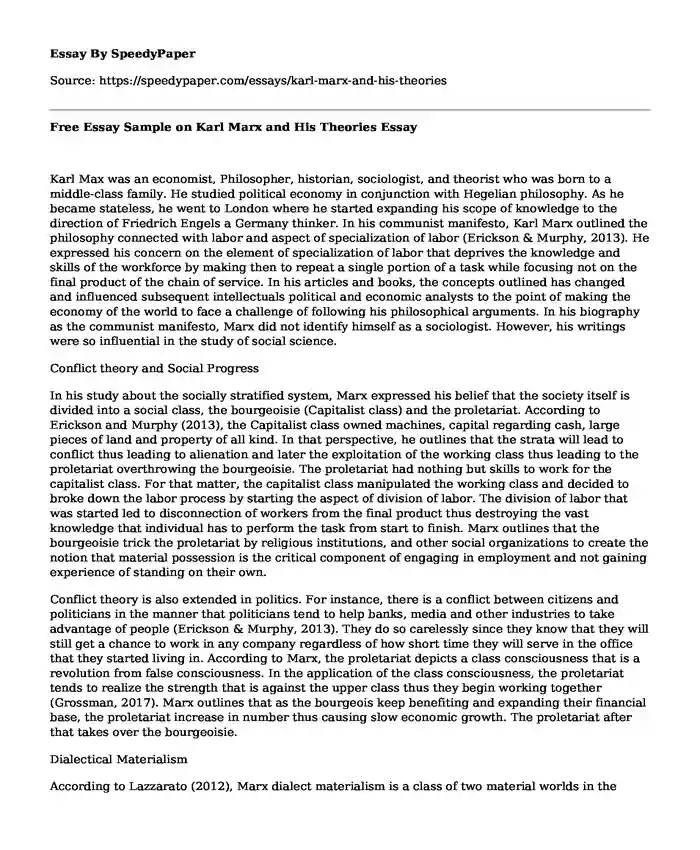
| Type of paper: | Research paper |
| Categories: | Philosophers Karl Marx |
| Pages: | 3 |
| Wordcount: | 697 words |
Karl Max was an economist, Philosopher, historian, sociologist, and theorist who was born to a middle-class family. He studied political economy in conjunction with Hegelian philosophy. As he became stateless, he went to London where he started expanding his scope of knowledge to the direction of Friedrich Engels a Germany thinker. In his communist manifesto, Karl Marx outlined the philosophy connected with labor and aspect of specialization of labor (Erickson & Murphy, 2013). He expressed his concern on the element of specialization of labor that deprives the knowledge and skills of the workforce by making then to repeat a single portion of a task while focusing not on the final product of the chain of service. In his articles and books, the concepts outlined has changed and influenced subsequent intellectuals political and economic analysts to the point of making the economy of the world to face a challenge of following his philosophical arguments. In his biography as the communist manifesto, Marx did not identify himself as a sociologist. However, his writings were so influential in the study of social science.
Conflict theory and Social Progress
In his study about the socially stratified system, Marx expressed his belief that the society itself is divided into a social class, the bourgeoisie (Capitalist class) and the proletariat. According to Erickson and Murphy (2013), the Capitalist class owned machines, capital regarding cash, large pieces of land and property of all kind. In that perspective, he outlines that the strata will lead to conflict thus leading to alienation and later the exploitation of the working class thus leading to the proletariat overthrowing the bourgeoisie. The proletariat had nothing but skills to work for the capitalist class. For that matter, the capitalist class manipulated the working class and decided to broke down the labor process by starting the aspect of division of labor. The division of labor that was started led to disconnection of workers from the final product thus destroying the vast knowledge that individual has to perform the task from start to finish. Marx outlines that the bourgeoisie trick the proletariat by religious institutions, and other social organizations to create the notion that material possession is the critical component of engaging in employment and not gaining experience of standing on their own.
Conflict theory is also extended in politics. For instance, there is a conflict between citizens and politicians in the manner that politicians tend to help banks, media and other industries to take advantage of people (Erickson & Murphy, 2013). They do so carelessly since they know that they will still get a chance to work in any company regardless of how short time they will serve in the office that they started living in. According to Marx, the proletariat depicts a class consciousness that is a revolution from false consciousness. In the application of the class consciousness, the proletariat tends to realize the strength that is against the upper class thus they begin working together (Grossman, 2017). Marx outlines that as the bourgeois keep benefiting and expanding their financial base, the proletariat increase in number thus causing slow economic growth. The proletariat after that takes over the bourgeoisie.
Dialectical Materialism
According to Lazzarato (2012), Marx dialect materialism is a class of two material worlds in the society that leads to the formation of a new system which is emerging as a new conflicting system with the existing one. For instance, Marx outlined that capitalism was created after the feudal system began to develop a market by itself. Capitalism was designed because there was a clash of the feudal society and the developing market.
Therefore, Marx's theories have proven to be very relevant in the study of the economy through the analysis of influential figures in human history. For instance, through his works, his philosophical concepts can be connected to those of Chomsky that outlined about manufactured consent and the struggle of protected intellectual self-defense.
References
Erickson, P. A., & Murphy, L. D. (Eds.). (2013). Readings for a history of anthropological theory. University of Toronto Press.
Grossman, H. (2017). Capitalism's Contradictions: Studies of Economic Thought Before and After Marx. Haymarket Books.Lazzarato, M. (2012). The making of the indebted man: An essay on the neoliberal condition.
Cite this page
Free Essay Sample on Karl Marx and His Theories. (2022, Feb 16). Retrieved from https://speedypaper.net/essays/karl-marx-and-his-theories
Request Removal
If you are the original author of this essay and no longer wish to have it published on the SpeedyPaper website, please click below to request its removal:
- Free Essay with Soren Kierkegaard's Thoughts on Truth and Subjectivity
- Essay Sample: Behavioral and Contingency Theories of Leadership
- Essay Example on the Significance of the Development of Cannabis-Infused Drinks
- Free Essay Claiming that Male's Facial Makeup Should Not Be Treated Differently
- Free Essay on Features of Equal Employment Laws
- Crystallographic Studies of Sr2+ and K+ Ion-exchanged Zeolite Y (FAU, Si/Al = 1.56) from Binary Solution with Different Mole Ratio of Sr2+ and K+
- Evidence-based Stress Management, Essay Example for Free Download
Popular categories




